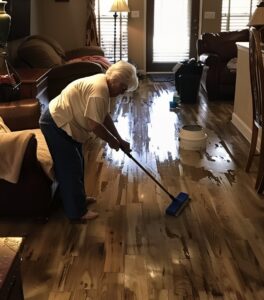When my grandmother moved in with my brother Mike a few months ago, I was hopeful that this would be a time of family support and care. But as the weeks went by, it became clear that Mike was far from the considerate grandson I had hoped he would be. Despite Grandma’s worsening back problems, she was the one cooking, cleaning, and doing laundry, while Mike seemed to do nothing but complain and watch TV.
One evening, I decided it was time to intervene. I asked Mike if I could host a small party at his house, and he agreed, thinking it would be a good way to reconnect with old friends. Little did he know, this would turn into a lesson on family responsibilities.
On the day of the party, I went to Mike’s house early to set up. I intentionally made a mess—spilling drinks, scattering crumbs, and leaving dirty dishes everywhere. By the time the guests started arriving, the house was in complete disarray. Grandma, as usual, was in the midst of trying to clean up, scrubbing the floors with visible effort.

Mike came downstairs and was immediately alarmed by the state of the house. He saw Grandma on her hands and knees, trying to mop up the mess I had made, and his frustration boiled over. “Grandma, did you forget to clean up?” he muttered loudly enough for everyone to hear.
The room fell silent. Guests exchanged glances, clearly uncomfortable. Among them was Mr. Parker, one of Mike’s former teachers, who shook his head in disapproval. “Mike,” he said firmly, “you should be ashamed. She’s your grandmother, not your maid.”
The weight of Mr. Parker’s words hit hard, and Mike’s face flushed with embarrassment. Realizing he had been caught in his neglect, he stomped upstairs and locked himself in his room, avoiding the rest of the evening’s events.
The party continued with a more somber tone. I took the opportunity to clean up, with guests pitching in where they could. When Mike eventually came downstairs, the damage had been done. The guests were gone, and Grandma, though clearly tired, had been able to enjoy a quiet, respectful end to the evening.
Later, when Mike and I were alone, I confronted him. “Mike, Grandma is not a servant. She’s family, and it’s your responsibility to take care of her, especially since she’s been taking care of you. Today was about showing you what happens when you let someone else do all the work while you sit idly by.”
Mike’s initial defensiveness faded as he saw the genuine hurt in my eyes. “I didn’t realize…” he trailed off, struggling to find the right words.
“I hope this experience makes you think twice about how you treat Grandma,” I said. “She deserves better than being ignored and overburdened.”
From that day forward, Mike started to take more responsibility around the house. It wasn’t perfect, but the change was noticeable. Grandma’s burdens were lighter, and Mike began to appreciate the value of family care and respect. The party, though uncomfortable at the time, served as a necessary wake-up call, reinforcing the importance of treating our loved ones with the dignity they deserve.





